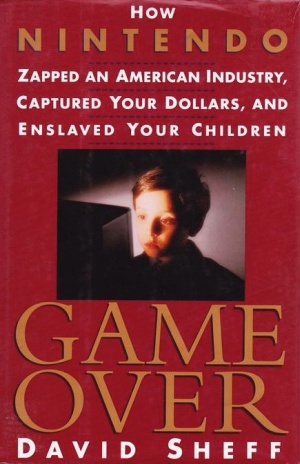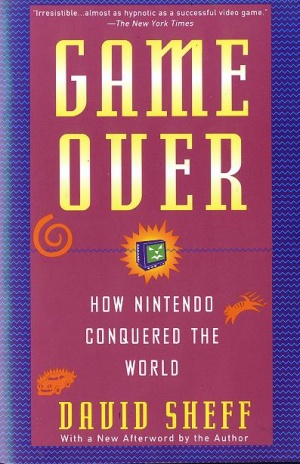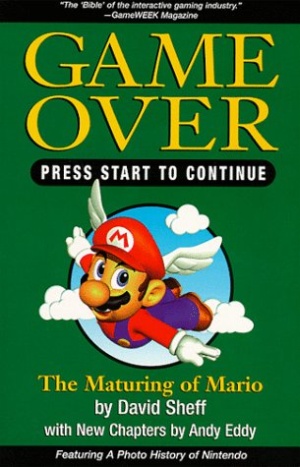
Video Game Book Reviews
Game Over: How Nintendo Zapped an American Industry, Captured Your Dollars, and Enslaved Your Children
If someone would have asked for video games-related books to recommend during most of the 1990s, the first answer would have been almost invariably: Game Over. Maybe the most seminal monograph in the history of video game journalism, David Sheff for the first time dug deeper than anyone would have thought possible into the affairs of one of the most seclusive companies within a seclusive industry. Maybe one of its biggest strengths was the fact that David Sheff wasn't a video games journalist - his previous monograph was titled The Playboy Interviews With John Lennon and Yoko Ono - making it much easier for him to draw to him the attention of the general public; the parents, the competitors, the politicians. With tons of interviews of people that must have seemed unreachable to the general gaming press, it offered an unseen insight into a the history and day-to-day workings of Nintendo Co. Ltd., from its very beginning as a local card game manufacturer, through Hiroshi Yamauchi's reign and the transformation into the world's major video game company, to its conquering of the United States (which ultimately is the focus of the book) and its first steps into the rest of the world.
But how relevant is Game Over in 2012, almost twenty years after its initial release? Well, looking back from a nowadays' perspective, with several great books on video game history available, the first disappointment with Sheff is clearly: he is not a video games journalist. He proves that whenever he descends to actually talk about games and their history. Actual assessments of games' quality, for example, are rarely longer than one or two words ("awesome," "bad"), and sound like he just casually asked his son to fill them in for him. Worse are explanations of technology, which seem like they're either written with a lack of understanding, or with the fixed assumption that they wouldn't be understood by the readership, anyway. In the end these passages read like tech babble from Star Trek, even if the matter isn't all that complicated. The comparisons applied here limp, too. Putting up the NES against the antiqued Atari VCS to demonstrate its technical prowess is the most harmless fumble here. It gets worse when Gilette razors are deployed to explain the implications of the NES' lock-out chip.
Game Over is also riddled with factual errors that show Sheff either wasn't too much concerned with detail, or how much he was at the mercy of his interviewees. He attest's Nintendo's R&D teams the achievement of developing carts with 8 megabytes of memory for the original Famicom (an amount barely reached with the largest SNES cartridges), introduces Enix, a mildly successful publisher of home computer games before their first Famicom game made the market, as "a start-up formed specifically to create Nintendo games," writes about the 1984-released The Black Onyx that its creator "Rogers sold 100,000 copies in 1980."
These errors appear minor when accepting the fact that Game Over is not a book about video games, not even unconditionally about a company named Nintendo. What Sheff is really interested in are people, Nintendo just the thread that ties all their fragmental biographies together. Often he goes on chapter-long tangents when he traces Nolan Bushnell's career through Atari, draws a picture of the working climate of EA under Trip Hawkins or describes (much briefer) the Teenage Mutant Ninja Turtles phenomenon. (Where he also shows he doesn't know jack about the actual franchise. "Numchucks" and "mutigant," anyone?)
But even in his drawings of the lifes and careers of personalities such as Bushnell, Hawkins, the Yamauchi clan or NOA vice president Howard Lincoln, there's always that certain uneasy vagueness when processing the information. Despite drawing most of his material from interviews, Sheff only occasionally attributes quotes. He is much more concerned in delivering a gripping narrative, often assuming the stance of an all-knowing third person narrator. Sometimes it's possible to deduce who his source is, like when he goes out of his way to name the secretary that served the tea during Yamauchi's first meeting with Henk Rogers - Reiko Wakimoto - but oftentimes people remain nameless. Then there is "a Nintendo employee," "one distributor" or "a reporter for a for a consumer-electronics trade journal." Even Akira Toriyama (whom he doesn't interview, only mention) is just "a well known illustrator" to him. About Namco's Pac-Man, he notes that "Nakamura awarded the engineer who came up with the game a piddling $3,500. Disgusted, the man left the video-game business," without even naming Tooru Iwatani, who as we know today should stay with Namco for a long time.
Occasionally the well-read (and -podcasted) reader nowadays might get bored over all the "reveals" that are pretty much common knowledge - until one realizes, they are only common knowledge thanks to Game Over. Yet the many errors, were we simply know better now, leave one wondering what facts we still can't easily check are off, too. What about the details on the many litigations around Nintendo of America, with Atari and others? What about the mess with the licensing of Tetris and the shady deals with the Russian copyright owners? Often the author fails to hide the fact that he's secretly cheering for his major interview partners at NOA, although he doesn't simply gobble up all their words. When it comes to report on the possible positive or negative influences video games may have on the development of children, he is wise enough to simply state the different standpoints in the debate, and makes a point of the fact that he's just quoting others, with his own judgement never going beyond chastising Nintendo for some "lame" arguments in the matter. Despite the slightly sensationalist subtitle and cover of the first edition, he never sets out to condemn the games themselves, though.
This here review is about that first edition. A second with a new preface on the recently-emerged debate on violence in games followed a year later. In 1999, there was a third edition, which not only adds some photos to the previously plain text, but also some chapters not written by David Sheff himself, but one Andy Eddy. The original book was written at such a convenient time, though: Back then the Sony PlayStation was still an upgrade to the Super Famicom (and Nintendo had won back licensing sovereignty after first stumbling over a unusually loose agreement with Sony, which would have made it a true Sony console with the added bonus of Super Nintendo compatibility), and Game Over dilligently tries to conclude by building up Nintendo as the vanguard for the future of multimedia home entertainment. Too sweet is the irony that Nintendo soon after turned to be the only console manufacturer that would abnegate the pursuit to dominate living room and settle on consoles that were just gaming devices.
Game Over ends (in the original edition at least) on a borderline surreal epilogue that describes Tetris creator Alexey Pajitnov's move to the united states and a strange experience he had that inspired him to a game concept. And it is sections like this where Game Over still shines, and is still unequaled in all of video games writing. The best parts of the book are where it conveys the dreams, hopes, feelings and emotions of the people its is ultimately dealing with. We don't need to be perfectly sure about the exact details of the Yamauchi family when we learn what it was like to be a Yamauchi, what it felt like for Arakawa to enter his father-in-law's company and bring it to the states, or how it felt for Atari and Tengen engineer Dan Van Elderen to go against the behemoth that was Nintendo in the early 1990s.
Browse on Amazon.com (revised 3rd edition; 2nd edition ebook)


